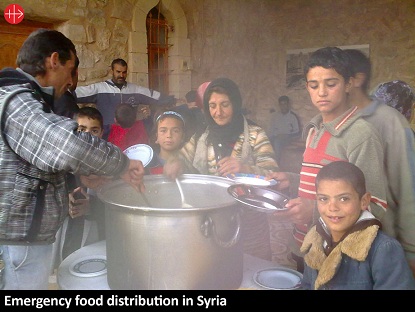Starved into submission
- Rebels as well as Government are denying food aid, says charity projects chief
- Entire communities at risk of starvation as aid convoys are denied access
Food has become “the most deadly weapon of war” in Syria, according to a leading Catholic charity’s Middle East projects coordinator, who says both government and rebel forces are blocking humanitarian aid to force entire communities on the brink of starvation to submit to their rule. Father Andrzej Halemba, from Aid to the Church in Need, says that many groups are preventing food aid from getting through in an attempt to weaken the resistance of opposition groups.
Fr Halemba, who is in constant communication with Church leaders in Syria and who visited the country three times last year, said the crisis was putting extra pressure on ACN and other organisations to increase emergency help to areas open to aid. Such regions have become a magnet for people fleeing aid-blockaded areas. Fr Halemba said: “Forces on both sides – Government and rebels alike – are preventing humanitarian aid from getting through in an attempt to subdue the people.”
He added that rebels had taken humanitarian aid and sold it to the highest bidder to generate funds.
Referring to Madaya, the town north-east of Damascus where people have reportedly starved to death, he said: “There are quite a few places like Madaya where people are in desperate need but where help is not getting through.”Amid reports that up to 4 million peoplein Syria are living in areas cut off from aid, Fr Halemba cited statistics showing that, since the violence began nearly five years ago, 280,000 people had been killed in conflict but that 350,000 had died from lack of medicine and other essential supplies. Fr Halemba said ACN was building up emergency aid programmes in centres such as the capital, Damascus, which is receiving thousands of people fleeing Madaya.
Since March 2011 when the conflict began, ACN has provided £7.9 million (EUR€10.38m) in aid for Christians and others in the country. Of that figure, nearly 60 percent – EUR€6.2m – was provided last year alone. Last month, the charity put into action 19 relief programmes for Syria and is developing a further 20 emergency aid programmes for Syria to be rolled out over the coming months. ACN is working with bishops in Damascus, Tartus, Aleppo and Homs as well as Jesuits and religious communities providing food, medicine, anoraks and shoes in regions such as Aleppo, north-east Syria, as well as Homs, further south and surrounding Marmarita and the Valley of the Christians.
Fr Halemba stressed how the crisis was compounded by a loss of power supplies in key areas, saying that Aleppo had been without electricity since mid-November, a problem made worse by below zero night-time temperatures. Saying that last year 15,000 items of aid were given to families across the country, he added: “Many of the families have received numerous packages of aid from us. This year, we are seeking to increase our aid to meet the growing needs of the people.
“We wish to fulfil 100 percent of the requests we receive however it is not always possible to achieve everything we hope to do. Every item of help is appreciated so much.
“People have told us of their joy on receiving our help. They were crying with joy, saying now we can survive the winter.”
He spoke of the urgent need to provide aid to villages near the north-eastern city of Hassake newly liberated from Islamist forces. At present, many Assyrian Christians exiled from the villages are unable to return because of the lack of basic supplies. Fr Halemba urged renewed prayers for Syria, especially for 79 Christians kidnapped in the Assyrian villages near Hassake and held by Daesh at its stronghold of Raqqa in the north of the country.
Reports say the Islamists have requested ransoms of up to EUR€32,100 per person.
Fr Halemba went on to highlight the suffering of Christians unable to pay extortionate Islamic jizya tax demanded in areas controlled by ISIS (Daesh) and other militant groups.
He said that Christians were forced to pay jizya of up to 87,000 Syrian pounds per year (£275 or EUR€362 – according to the official exchange rate) but that people could not afford it in a country where since 2010 1 kilo of sugar has risen from 5 Syrian pounds EUR€2c to 5,000 Syrian pounds EUR€20.84.
Responding to the build-up of international military action in Syria, Fr Halemba said: “A Pandora’s Box has been opened up and nobody is willing to close the lid. Instead of talking about waging a war, what is needed is for people to sit down and talk about ways to bring peace. That is what the people really need right now.”
A truce to lift the siege on Madaya and other cities was brokered in September, but civilians are still trapped inside without food and medicine. Turkey and Iran can work with their allies to ensure the siege is lifted, but won’t act on their own.
An international petition is calling on UN Secretary General Ban Ki-moon to intervene and work with all sides to save thousands of families from starving to death in Madaya. Ban Ki-moon can do this — if the siege is lifted, it could set a hopeful foundation for upcoming peace talks. As his service to the UN ending soon, lifting the siege would be a great achievement for his legacy. With enough pressure from concerned people worldwide Ban Ki-moon could be persuaded to provide the help Madaya desperately needs right now.
Add your voice to thousands of caring people worldwide and sign this urgent petition. https://secure.avaaz.org/en/madaya_starvation_siege_loc/?bYTzKab&v=71244&cl=9222832632
John Pontifex






